![]()
The Words of the Windman Family
|
|
The Words of the Windman Family |
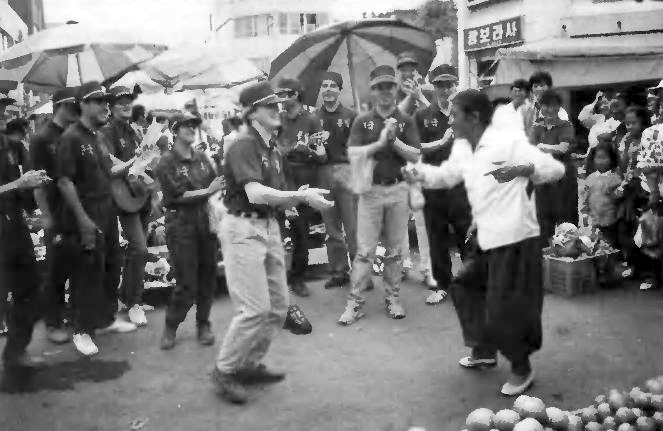
A
spontaneous celebration during one of the Western mobilized
members'
community clean-up activities.
Question: How long have you been mobilized here in Korea?
I've been here since the 1275 Blessing on January 12, 1989, after which Father asked all the blessed members who could stay to stay.
At that time 585 remained. We had a workshop, and then on January 22 Rev. Kwak spoke to us and the mobilization began. After about one year here, there are about 250 international (commonly called "Western") members from the original 585 (and 700 of the original 3,700 Japanese), as well as another 40 or 50 in other countries fundraising who are expected to return in the next month or so. "Western" means those members coming from world missions other than Korea or Japan. There are a few Koreans in the Western mobilization and maybe 25 or 30 Japanese, but all of them had already left their missions in Japan and were matched in America or have international blessings. So they are considered to be international members representing the whole world. For five years before this Father talked about the mobilization to Korea, but so far this year he's said nothing more to the Western members that we've received. However I feel it's clear that Father brought us here for three years and that one of his hopes is that we will actually be transformed by this experience in Korea to become world citizens and inherit the Korean traditions that are rooted in heaven's tradition.
Question: What has your mission been here?
Rev. Su Won Chung, a 36 blessed couple who was previously a regional leader in America, has the responsibility to lead both the Japanese and the Western mobilization. I am his assistant for the Western members.
We set up the mobilization headquarters in one of our movement's office buildings, but for the first four or five months Patrick Kirkbride and I served as IWs, spending most of our time traveling around Korea to help members ad- just to their various situations and gain the vision of our work here.
After that Patrick and I pretty much settled into the office. All of our Western members are blessed couples, and because many of them are physically older or reblessed, they were immediately eligible to begin family life. Our blessed family counselor is Rev. Chung, but the administrator for that was Patrick.
I continued with all the rest of the support for members. Western members are in 14 regions and each one has a Western regional leader. I would communicate Rev. Chung's directions to these leaders and they would communicate with the Western members.
Since Patrick changed missions in October, I basically do everything in the mobilization office for Western members, including the blessing counseling, running the computer, and answering the phone. I have stopped traveling, but Rev. Chung goes to all the regions and speaks to the members directly. The Western members who live in the Seoul area have a monthly meeting during which we receive guidance from Rev. Chung.
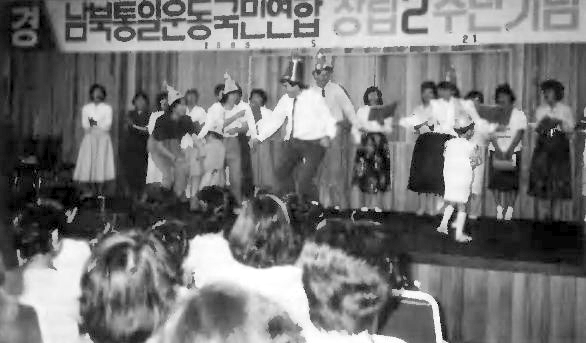
Japanese
and Western entertainment on the Second Anniversary of the Citizens
Federation for the Unification of North and South
Question: Are the mobilized members doing different things from when they first came?
The basic direction we received from Rev. Kwak when we were mobilized hasn't changed, and I think our main external activity will remain pretty constant for the next three years. We are expanding the foundation for the Segye Ilbo by delivering it and getting new subscriptions, and we are to witness and learn the Korean language. The main internal activity is to absorb and be transformed by the Korean culture. We are here to help publicly, but I think Father really brought us here to pioneer this course of moving to a different level through the heartistic education program living here provides.
From the very beginning we did witnessing. Just as in America or any other large country, in some regions people really emphasize witnessing and in others there was no foundation, making it more difficult. We bring people to the center, and the Korean members care for and try to educate them.
Speaking only a little Korean was no problem in witnessing for Western members because Koreans are very inquisitive, and they like to speak English. If you look like you are English-speaking, many will just come up and start talking to you in English. Meeting people is much easier in Korea than in America in that sense.
Question: I heard also that some members teach English to students in some areas.
Yes, some couples already starting their families need a financial foundation. One of the couple will get a permit and find a teaching job while the spouse remains fully mobilized. Others teach as a church outreach project and community service and meet wonderful people that way, though they don't earn money. Several people have joined through language study with us.
The first year about 70 Koreans joined the church through Western mobilization members and consistently continued studying, and probably many more signed membership. Though Western members have always been far outnumbered by the Japanese, we probably have about equal witnessing results. Because the Japanese have so much resentment to heal, it's much easier for Western members to witness to Koreans than for the Japanese, even though the Japanese are far superior in their Korean language skills and cultural understanding.
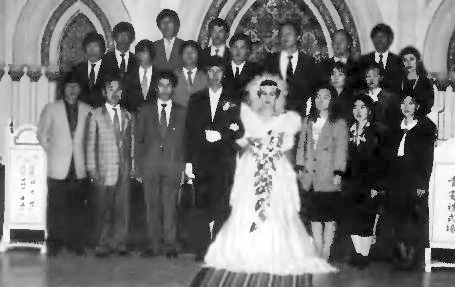
A
Korean/Japanese wedding celebration in the Korean spouse's hometown
Question: What kind of victories have you had?
In the first year, one of the biggest victories has been the healing of relationships between Koreans and Japanese.
Father invited us all to live in the Unification churches here, but the Korean church members have never worked outside of Korea. They really had no idea how to take care of international members, and we sensed that of course it would be much easier if we weren't here. The Korean people by nature are very gracious hosts, but it is very different when you actually move into their family!
Traditionally the moksanim-samonim, (the minister and his wife) and their blessed children actually live in the church, with perhaps one or two Korean members who help take care of the family and the church. The rest of the congregation are families who come for church events and activities. When there is a witnessing campaign, they will bring neighbors and relatives each night for the speech or meeting. Most of the week the church is not used so much by the congregation, though Sunday all the churches are packed to the rafters with the people who come for the church service.
Then almost overnight the small church centers had to accommodate 4,300 [Western and Japanese] additional full-time, live-in members. About 2,500 were in the Seoul area, which has about 120 churches.
In many churches all of the Korean family would move into one room, which was the minister's space for preparing his services. Suddenly his whole family was living in this one room together, because the Japanese and Western members were now in the children's rooms. In some places the church itself was their bedroom at night because it was the only place to stay. The whole Korean church had to shrink down their own area and lifestyle to accept us in. We presented a tremendous inconvenience, and it was very challenging.
We understood very little Korean and many Korean members only speak Korean. About 10 percent of the original mobilization group didn't even speak English, so our own leadership also had trouble communicating with some of their members. That was an even more difficult course.
But in July, when about 3,000 Japanese members returned to work temporarily in Japan, we could see in the send-off the Korean church elders gave the Japanese at the airport the heartistic change that had taken place in the relationship of the Koreans and the Japanese. Though in tic beginning it was kind of "Why are all these people here? They are really kind of in the way and everything is more difficult now," after only five or six months both Koreans and Japanese shed so many tears when the Japanese brothers and sisters left.
The beauty of the Korean people and our church members is their heart. Even if we make it difficult for them, eventually they embrace and accept us much more easily than Western or Japanese members could. We were really accepted as part of their families.
In the first year that kind of heartistic union, especially between the Koreans and Japanese, was really the major accomplishment and victory. I think the Japanese learning to relate in Korean had a major impact because historically the Japanese had forced the Koreans to relate in Japanese. No Korean head of state could ever visit Japan before because there was too much hatred on both sides. But now President Roh has set up a visit to Japan, though it's been delayed because he said, "First we have to solve the problem of the third generation Koreans in Japan." If you live five or six years in America, you can become a citizen, but Koreans who have been in Japan three generations and don't even speak Korean still haven't been granted citizenship there.
Father said that during the first six months of 1990, the Japanese members should learn how to teach Principle in Korean. Then they will pioneer new churches in the rural areas and become the moksanim or leader of churches in small communities. At the end of the three-year mobilization they may go on to China.
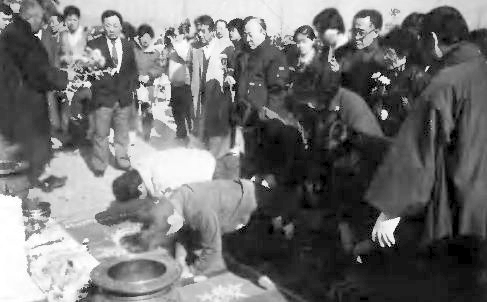
South
Koreans bow to their ancestors in North Korea at the DMZ on the Lunar
New Year.
Question: Are their spouses Korean?
Not all, but most. Also the 3,000 who have gone to Japan are supposed to come back at some time. Their preparation is to go to China also.
The biggest practical development in the Western mobilization is in our visa situation. In the beginning every three months we would have to go to Japan to renew our tourist visa, which is not the right visa for staying a long time in Korea. Then finally last fall we were able to set up with the Korean government a formal church training program and get approved a church training visa. So now pretty much we can stay here indefinitely.
When we reported that this was about to happen to Rev. Chung, he said that the government's giving this kind of resident visa for our foreign church members would be a major victory, because we have had a lot of official difficulties for many years.
The Western members got this visa first. The Japanese have had to go to school here, which is very expensive and time-consuming, in order to stay more than just one month. But now all the Japanese members have also switched over to the training visa, so they don't have to attend school.
It's a big difference. I think it is important for people to know, because many people left after the blessing just because of the Korean visa situation. Now, however, a person from any nation can come here and stay indefinitely with the training visa. This is an advertisement!
Basically, anyone from the 1275 blessing who wants to come is welcome. Rev. Kwak's direction to the 1275 blessing members is very strong: Unless you have an urgent reason not to be here, you should be here. Rev. Chung encourages those people who haven't made their mobilization offering to bring at least $1,500, which is what is needed to live a year here in the church. Especially spouses who are not in the country are all encouraged to join their mate here. Father's original plan is that blessed couples would come and work for Korea.
The members had been spread pretty well evenly throughout Korea at the beginning of the mobilization. Then another major development occurred right after the 3,000 or so Japanese members returned to Japan in July; over 100 members from the provinces were called to Seoul. At that time, it became even clearer to me how important it was in Korea for Westerners to help expand the Segye Ilbo foundation.
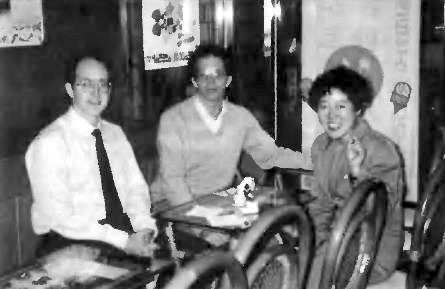
Birthday
celebration for the first full-time member to join through the
Western mobilization witnessing in Korea
Question: What more have you understood about your purpose here?
Father hasn't said so much about why we are here. I feel we are here to be an offering. Though we didn't realize this at first, through this mobilization in essence each country and each element of True Parents' world movement have sent representatives as an offering or gift for the sake of Korea during this three-year period. We represent a sacrifice on the part of those nations and departments, and through us it's as if the national leader and all the nation's members are also here working for Korea. It is so important for the home nation to support through prayer and letters -- spiritually, emotionally, and financially, if possible -- that member who represents what that nation is giving to Korea. For example, the Peruvian members here represent Peru. They will determine the merit or fortune that Peru can inherit through this.
Father said that actually Korea didn't need another daily newspaper, but the Segye Ilbo is an instrument of God's love and judgment for Korea. Before North and South Korea can be united, South Korea must be divided into Abel and Cain sides. Those who respond positively will stand as the Abel South Koreans. Others, those who reject or persecute Segye Ilbo will be the Cain side. Once Korea is divided clearly by Segye Ilbo, then the Abel side will have to work to win the Cain side. This is all part of the four-year process that we are in now for North and South reunification. That's its more internal purpose.
More externally, Father is giving the Segye Ilbo -- "World Times" or "World News" -- to the Korean people to help them move from the national to the world level. Most Koreans are very nationalistic but are not so concerned about the world.
One more reason the Western members specifically are here is this: after the 1988 Olympic victory Father could proclaim October 3rd the Foundation Day for the Nation of the Unified World, which is a significant turning point in human history. It established the Garden of Eden on the national level and was the foundation day for Korea to become the world nation and to create the unified world here in this country. Now, on the international level, Father has brought Adam, Eve, and the archangel to Korea, the restored Garden of Eden. Adam is the Korean people, the Korean church; Eve is the Japanese church; and the archangel position is all the world nations, especially the Western developed countries. Father asked the members from these developed nations to make the mobilization offering, not the South American or African members. The archangel had to bring the offering.
Then at the end of October 1989 in Korea there was the blessing of Adam and Eve: Korea and Japan. January 1990 was the archangelic blessing. The same thing was supposed to happen in the Principle of Creation. First Adam and Eve would be blessed, and then the angels could receive heaven's blessing. Now in Korea, the original ideal has happened on a world level amongst the members of our international church.
But though we've received the blessing, Adam, Eve and the archangel all have to grow up. The Western members stand in the position of the archangel to fulfill what Lucifer did not do in the Garden of Eden. He could not accept, and thus left, his position of servant to Adam and Eve. Fortunately most of the Western members stayed and are continuing to work, but some left because of the difficulty here in Korea. Others left with God's blessing -- to start their families or because their national leaders called them back for very important responsibilities. As archangels, we have responsibilities not just in Korea but in the whole world. And though we have a temporary restoration mission as an archangel in Korea, as blessed members, we also have an eternal responsibility as God's Adams and Eves, His sons and daughters.
The remaining Western members must fulfill this archangel position. Though it has been very difficult emotionally in Korea for the Japanese members, spiritually they are in the high position of bride of Adam, like royalty. But in the Korean church structure now Westerners are in the servant of servants position, and from that position we have to grow up. The lifestyle here is challenging for the members from developed nations. For example, most churches have no hot running water, and the rural churches all have outhouses for their bathrooms. Father is asking the Western members to go from the top, representing our developed nations, and come down to the bottom to go underneath and serve the Korean and Japanese societies. We are to restore the failure of the archangel and be the pioneers to create the foundation for all of our home nations to come and take the proper relationship to Korea and Japan as the parent nations.
I am sure you have heard many times that the new era is the Pacific basin era. Korea and Japan will be the central parents. China, the United States, and the Soviet Union are all actually archangel nations in this Pacific basin community. Really we are the worldwide spiritual pioneers to allow these relationships to develop. First, Father himself goes that course; then he asks his children.
This is why this whole providence is taking place with only blessed members. After the Blessing, the first group that was sent away from Korea were those who did not receive the Blessing. For many of them it was kind of doubly heartbreaking because not only was there no match for them, but also they were not allowed to stay in Korea. None of us understood why at that time. But now we see that by allowing only blessed members to stay, is Father's way of saying: I am sacrificing myself and my own sons and daughters to enable the nations of the whole world to take their proper position.
Another thing we are doing practically and spiritually is making in Korea the foundation for the new world culture described in number five of the Pledge. We are pioneers from every continent, race, religion, and economic background working to make that new cultural tradition and overcome all our fallen nature, arrogance, and cultural barriers. The new world cultural festival will occur in August 1991, the eighth month of the third year for us; on the foundation of the mobilization. Father said that will be the dawning of the new world culture.
Originally Father had planned the festival to be in 1990, at the top of the growth stage of the mobilization -- the end of the first two years. It was changed to one year later, I believe, because at the end of two years we still wouldn't have the foundation. When you are asking the world church to bring 100,000 actual blessing candidates, God and spiritual world must be with you. Father has all the different pieces and is putting them in place step by step.
Father hasn't said anything about this. We are in a sense set adrift to understand these providential things ourselves, though Rev. Chung guides us in our blessing and in our life of faith. He is helping us to realize that this is the time that Father wants us to go through experiences he had in Korea so we can develop a closeness to him that there is no other way to create.
Question: What have you come to appreciate about Korea and our movement here?
The Korean church structure is very different from the American and the Japanese movements. Most international church members are guided by a strong central figure who is clearly dividing us all the time. But in Korea, the ones who want to commit their lives are their own central figure, pushing themselves every day to do something for True Parents. So the Korean church does not have a strong central figure who directs all the Korean regional leaders, who then direct all the local church moksanims. Each church in a sense is kind of a little kingdom centering on the minister and the minister's wife of that church and that congregation. True Parents give them great freedom to decide how to best organize and carry out the responsibilities in their region. Many times some kind of guidance and direction comes from the organizational center, but they still have the freedom to take it or not. True Parents are the central point. The organization isn't.
The Korean church is really a heartisticly motivated, True Parents-centered movement. For Western members, and for Japanese too, it is kind of a big shock because usually we spend a long time learning how to unite and follow and be a good object. But just about everybody in the Korean church is a subject. In fact, everyone in Korean society is a subject. In that sense spiritually it's an Adamic society. Even little children are subject here, very confident, very bold. One of the most beautiful things I am learning from this culture that raised such a man as Father is this sense of subjectivity, having strong confidence in our Principle, in our Parents, in myself, and then just going out and gaining dominion over any situation. To be like this is not just Korean; as Father would say, it's the heavenly tradition, the Adam tradition.
Before I came here I knew providentially and academically that Korea somehow was the hope for the West, because the West is in such a moral, ethical, and now even economic decline. Father talks about the family unit being the center of society, with individuals living for the family, and the nuclear family being the building block of society. Korea is in fact a family-centered nation, a national family. Koreans genuinely treat each other as brothers and sisters, fathers and mothers. Even people whom you've never met are called ajoshi and ajuma, uncle and aunt. They've actually made a national level family.
For example, if you look closely at tilt student riots here, you see it's kind of like a sport or a game, very different internally from what happened in Eastern Europe or China or even America. The students rebel, trying to demonstrate their growing subjectivity, like a younger brother exerting his masculinity against the older brother. The older brother, the police, stand back and let them go further than they would ever let them go in America. Even if the students set fire to a car or police bus, the police don't rush in and start beating them up. Maybe they will use tear gas.
When they do start beating them up, it's not as if they are beating up the enemy. It looks like when a younger brother teases his older brother who then straightens the younger brother out by beating him up: "Okay, now you stepped over the line and that's why I have to teach you." There's a lot of physical force in Korea, much more than in America. It's natural for brothers to fight, but usually they love each other very deeply.
From talking to the students you can see how shallow their resentment or rebellion really is. There is no ideological depth to it. They need to learn that this government is not a dictatorial regime, so they don't need a revolution. Many of the leftist leaders, some of whom have come to America on CARP-sponsored trips, have become very good friends with Western members. Most of them are learning English and their future commitment is to the world.
Most people in Korea really love Westerners in general and especially Americans because the Korean people know absolutely that America helped to liberate Korea from Japan, and to liberate South Korea from communism and keep it free. Fifty thousand Americans died doing that. Koreans are very serious and very sincere. If you give to or do something for them, they feel indebted deeply from their heart. That's the sentiment they have toward the nations who sent troops during the Korean War. There is not strong anti-Americanism here, although it is growing. The deep root is genuine love, respect, and admiration.
Korea is trying to model itself externally after the Western nations, particularly America. Koreans want the good life, but they don't want to follow the same path of decline as America.
The major difference now is the strength of the Korean one nation family. It is not ideal, it is not the Kingdom of Heaven yet, but I could never feel anything like this anywhere in America. Maybe everyone knows each other in a small traditional rural town in America, but that is more on a community level. Here on a national level all the people, whether they know each other or not, treat each other as if they are relatives, family. And I am sure the same thing will happen when the DMZ goes down and they start having give and take with North Korea. The North Koreans are family, no matter what the politics, the ideology.
We really have to learn how to feel toward and treat each other as family. Father has been teaching us that we have common parents and are in reality one family. Different colors, languages, and cultures have blinded us to that fundamental reality. We must find the ways to meet someone and not just say, "You are my sister," but make her feel as a sister to us, that we share the same blood and can experience that kind of security and ease in relationship. That's what we can learn in Korea in these three years.
After one year here Rev. Chung asked me what was the most notable thing I found that I didn't expect. I told him I never imagined that I would experience this sense of a national family. He said, yes, you are right.
When I visited America many things were familiar, but now I feel so much closer to Korean people than to American tourists. It is testimony to the change that is taking place in the brothers and sisters as we are here.